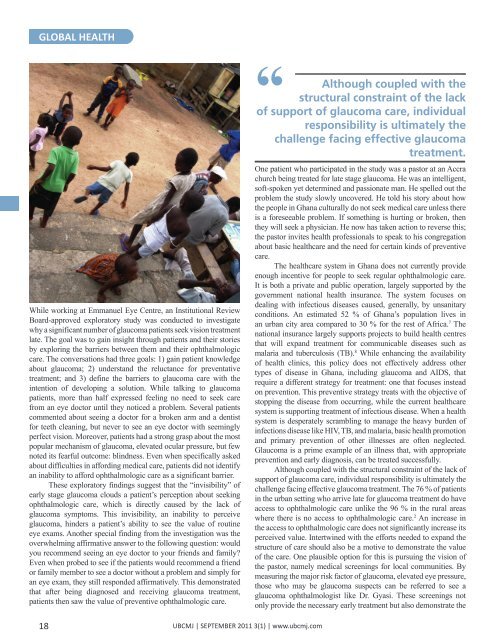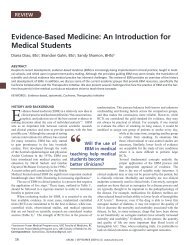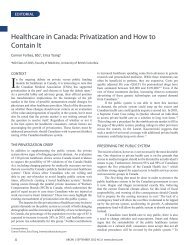Download full PDF - UBC Medical Journal
Download full PDF - UBC Medical Journal
Download full PDF - UBC Medical Journal
You also want an ePaper? Increase the reach of your titles
YUMPU automatically turns print PDFs into web optimized ePapers that Google loves.
GLOBAL HEALTH<br />
While working at Emmanuel Eye Centre, an Institutional Review<br />
Board-approved exploratory study was conducted to investigate<br />
why a significant number of glaucoma patients seek vision treatment<br />
late. The goal was to gain insight through patients and their stories<br />
by exploring the barriers between them and their ophthalmologic<br />
care. The conversations had three goals: 1) gain patient knowledge<br />
about glaucoma; 2) understand the reluctance for preventative<br />
treatment; and 3) define the barriers to glaucoma care with the<br />
intention of developing a solution. While talking to glaucoma<br />
patients, more than half expressed feeling no need to seek care<br />
from an eye doctor until they noticed a problem. Several patients<br />
commented about seeing a doctor for a broken arm and a dentist<br />
for teeth cleaning, but never to see an eye doctor with seemingly<br />
perfect vision. Moreover, patients had a strong grasp about the most<br />
popular mechanism of glaucoma, elevated ocular pressure, but few<br />
noted its fearful outcome: blindness. Even when specifically asked<br />
about difficulties in affording medical care, patients did not identify<br />
an inability to afford ophthalmologic care as a significant barrier.<br />
These exploratory findings suggest that the “invisibility” of<br />
early stage glaucoma clouds a patient’s perception about seeking<br />
ophthalmologic care, which is directly caused by the lack of<br />
glaucoma symptoms. This invisibility, an inability to perceive<br />
glaucoma, hinders a patient’s ability to see the value of routine<br />
eye exams. Another special finding from the investigation was the<br />
overwhelming affirmative answer to the following question: would<br />
you recommend seeing an eye doctor to your friends and family<br />
Even when probed to see if the patients would recommend a friend<br />
or family member to see a doctor without a problem and simply for<br />
an eye exam, they still responded affirmatively. This demonstrated<br />
that after being diagnosed and receiving glaucoma treatment,<br />
patients then saw the value of preventive ophthalmologic care.<br />
“<br />
Although coupled with the<br />
structural constraint of the lack<br />
of support of glaucoma care, individual<br />
responsibility is ultimately the<br />
challenge facing effective glaucoma<br />
treatment.<br />
One patient who participated in the study was a pastor at an Accra<br />
church being treated for late stage glaucoma. He was an intelligent,<br />
soft-spoken yet determined and passionate man. He spelled out the<br />
problem the study slowly uncovered. He told his story about how<br />
the people in Ghana culturally do not seek medical care unless there<br />
is a foreseeable problem. If something is hurting or broken, then<br />
they will seek a physician. He now has taken action to reverse this;<br />
the pastor invites health professionals to speak to his congregation<br />
about basic healthcare and the need for certain kinds of preventive<br />
care.<br />
The healthcare system in Ghana does not currently provide<br />
enough incentive for people to seek regular ophthalmologic care.<br />
It is both a private and public operation, largely supported by the<br />
government national health insurance. The system focuses on<br />
dealing with infectious diseases caused, generally, by unsanitary<br />
conditions. An estimated 52 % of Ghana’s population lives in<br />
an urban city area compared to 30 % for the rest of Africa. 7 The<br />
national insurance largely supports projects to build health centres<br />
that will expand treatment for communicable diseases such as<br />
malaria and tuberculosis (TB). 8 While enhancing the availability<br />
of health clinics, this policy does not effectively address other<br />
types of disease in Ghana, including glaucoma and AIDS, that<br />
require a different strategy for treatment: one that focuses instead<br />
on prevention. This preventive strategy treats with the objective of<br />
stopping the disease from occurring, while the current healthcare<br />
system is supporting treatment of infectious disease. When a health<br />
system is desperately scrambling to manage the heavy burden of<br />
infections disease like HIV, TB, and malaria, basic health promotion<br />
and primary prevention of other illnesses are often neglected.<br />
Glaucoma is a prime example of an illness that, with appropriate<br />
prevention and early diagnosis, can be treated success<strong>full</strong>y.<br />
Although coupled with the structural constraint of the lack of<br />
support of glaucoma care, individual responsibility is ultimately the<br />
challenge facing effective glaucoma treatment. The 76 % of patients<br />
in the urban setting who arrive late for glaucoma treatment do have<br />
access to ophthalmologic care unlike the 96 % in the rural areas<br />
where there is no access to ophthalmologic care. 2 An increase in<br />
the access to ophthalmologic care does not significantly increase its<br />
perceived value. Intertwined with the efforts needed to expand the<br />
structure of care should also be a motive to demonstrate the value<br />
of the care. One plausible option for this is pursuing the vision of<br />
the pastor, namely medical screenings for local communities. By<br />
measuring the major risk factor of glaucoma, elevated eye pressure,<br />
those who may be glaucoma suspects can be referred to see a<br />
glaucoma ophthalmologist like Dr. Gyasi. These screenings not<br />
only provide the necessary early treatment but also demonstrate the<br />
18<br />
<strong>UBC</strong>MJ | SEPTEMBER 2011 3(1) | www.ubcmj.com










